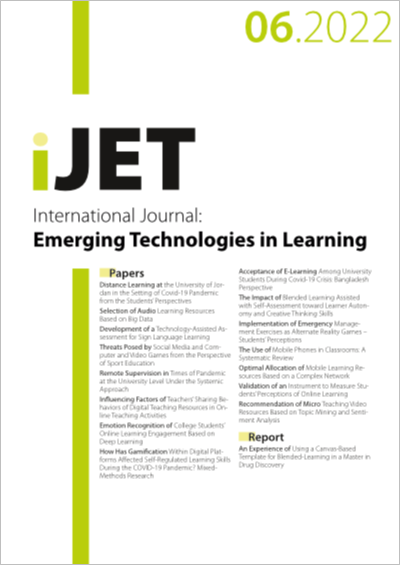An Experience of Using a Canvas-Based Template for Blended-Learning in a Master in Drug Discovery
DOI:
https://doi.org/10.3991/ijet.v17i06.28149Keywords:
graduate education, multidisciplinary education, cooperative learning, problem-based learning, drugs, drug developmentAbstract
Drug development is a complex process that requires multidisciplinary teamwork to overcome the uncertainty associated to the process. From this point, problem-based learning (PBL) methodologies are helpful to train future professionals dedicated to drug development in multidisciplinary environments. One of the strategies developed to design novel business models is Business Model Canvas (BMC), a strategy that has been widely employed in business schools, but not in scientific education. Thus, we wanted to verify if a BMC-like template was suitable for a PBL experience in the field of drug development using a blended-learning approach. The students of a research master subject were asked to create a joint project plan for the development of a novel drug for an unmet clinical need by making use of a BMC-like template as support for discussions on the project strategy, while combining online and face-to-face sessions. The methodology helped the students to learn about drug development, even in a blended-learning format. Most students considered that this methodology enhanced their participation in the working group and helped them to focus their arguments, proving that the employment of BMC-like templates is helpful to overcome the disadvantages of PBL experiences.
Downloads
Published
2022-03-29
How to Cite
Martínez, A. L., Brea, J., Castro, M., García, Ángel, Santamaría, E., Lestón, Óscar, & Loza, M. I. (2022). An Experience of Using a Canvas-Based Template for Blended-Learning in a Master in Drug Discovery. International Journal of Emerging Technologies in Learning (iJET), 17(06), pp. 257–267. https://doi.org/10.3991/ijet.v17i06.28149
Issue
Section
Reports
License
Copyright (c) 2022 Antón Leandro Martínez, José Brea, María de los Ángeles Castro, Ángel García, Eduardo Santamaría, Óscar Lestón, María Isabel Loza

This work is licensed under a Creative Commons Attribution 4.0 International License.


